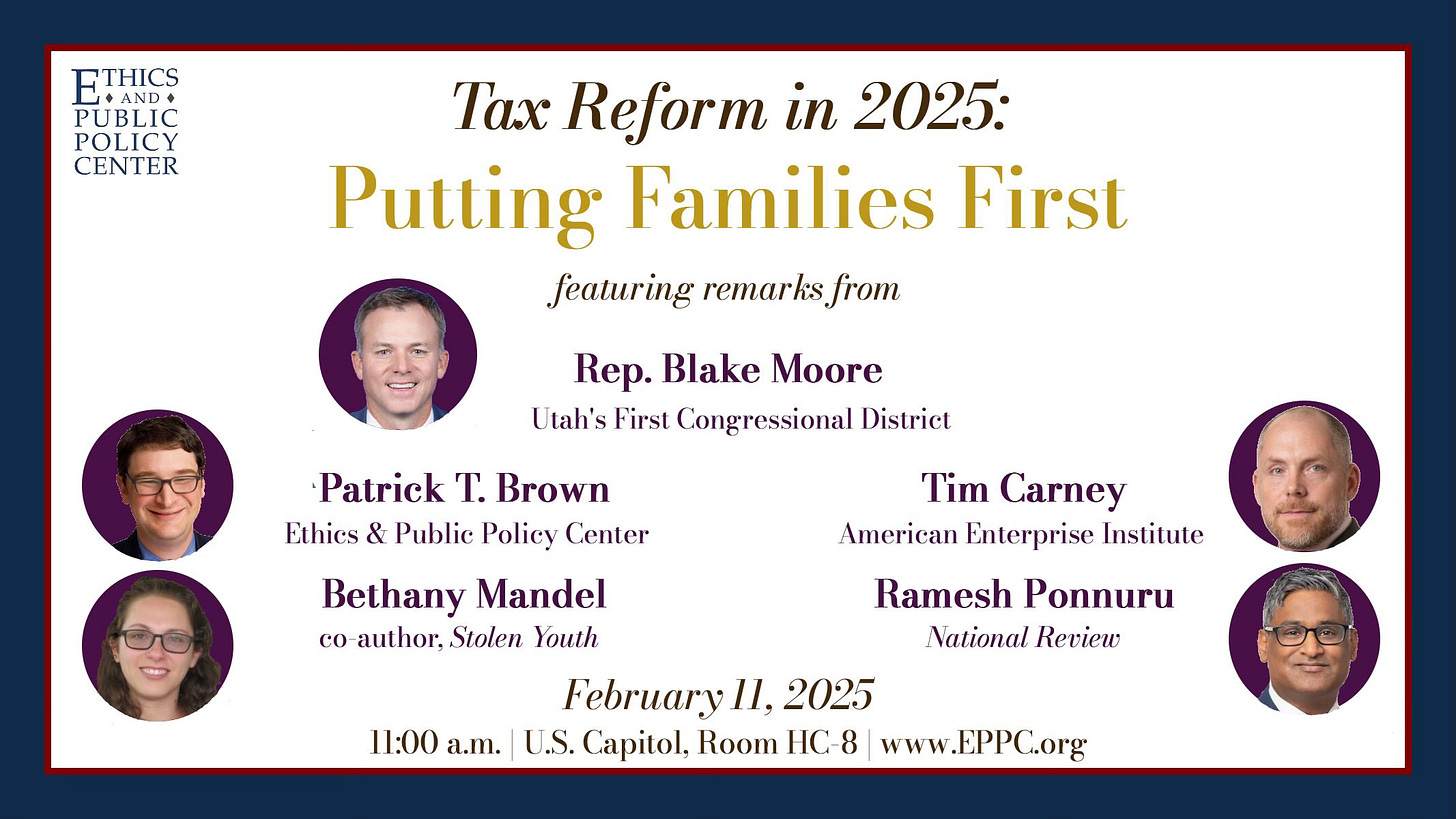All We Do is Win No Matter What?
The shock-and-awe approach of President Trump's second first fortnight
Family Matters expects to see you in D.C. on Tuesday, Feb. 11, for our event on pro-family tax policy in 2025, featuring Rep. Blake Moore, Tim Carney, Bethany Mandel, and Ramesh Ponnuru — details below!
The Main Event: An Exceptionally Energetic Executive
Putting Families First: Child Tax Credit event, Feb. 11 at 11a
Flowers of Fire: Co-hosting virtual book club on South Korea and the “4Bs”
It’s Me, Hi: Deseret News, Family Studies, American Compass
New Statement on Tech and Family Policy: The Family and The Future
Parting Shots
The Main Event
In Federalist 70, “Publius” made a strong case that the office of President, as proposed in the Constitutional convention, would help advance, rather than thwart, the cause of republican self-government: “Energy in the executive is a leading character in the definition of good government.”
Alexander Hamilton (sorry for doxxing you)…eat your heart out. The first twelve days of Trump II have been a keep-your-head-on-a-swivel onrush of statements and executive orders to give nearly every part of the conservative coalition something over which to stand up and cheer.

There is no possible way this newsletter could recap the flurry of executive activity since Jan. 20, so it won’t try. Sometimes the energy has been misplaced — the abrupt federal spending freeze was poorly implemented, and the push to curb birthright citizenship seems unlikely to withstand judicial scrutiny as written. But overall, President Trump and his team took office with the benefit of four years’ prep work and unleashed the kraken when it came to executive-level conservative priorities that unite the right:
A day one executive order (EO) seeking to roll back affirmative action at the federal level and one putting an end to federal DEI initiatives
On gender ideology, an EO defining the biological reality of sex throughout the federal government, an EO rescinding federal policies that rely on WPATH guidance and seeking to rescind any federal spending on transgender surgeries for children, and shuttering the White House Gender Policy Council
On abortion, EOs rescinding Biden-era orders that sought to use EMTALA, the FACE Act, and a reinterpretation of the Hyde amendment to leverage federal support for abortion access, and reinstating the Mexico City Policy, which ensures no U.S. funding goes to promoting abortion abroad, and pardoning pro-life activists who had been prosecuted for protesting inside abortion clinics
On the education front, an EO emphasizing parental rights and tackling curricula that favor identitarian approaches, and an EO seeking to expand federal support for state school choice programs
And the list goes on, and on, and on. We could include an exceptionally strong statement from Dr. Dorothy Fink, acting HHS secretary, laying out a vision of a department that will prioritize strong conscience protections and preserving human life. Or Transportation Secretary Sean Duffy indicating an intriguing willingness to give preference to communities with high marriage or fertility rates when allocating DoT capital improvement grants. Other interesting initiatives seem right around the corner.
Trump’s actions have given conservatives a reason to rally around the White House in a way that feels different than his first four years. The person and his baggage have not changed, but the party has, and so has America, having seen the results of four years of progressive energy. The missteps and misfires that left most Trump-skeptical Republicans lamenting their candidate of choice from 2016 wasn’t occupying the White House are now metabolized, part of a “you take the bad with the good” approach to policymaking that reduces the risk of same-team infighting. Can it last?
Two big strategic questions I see as facing the Trump White House are:
Can they play this hard for all four quarters?
Executive orders are a valuable tool in the arsenal, but they are by definition limited in scope and subject to being overturned by a future administration. And carefully reworking thwarted executive orders is less rewarding than launching new ones. Is the Trump administration prepared to expend political capital on trying to pass certain provisions legislatively codifying these sorts of actions? Can even this most energetic of executives possibly maintain similar momentum in the weeks and months ahead?
What happens if they triangulate?
Trump is in a unique position — a lame-duck President but one who has an electric and inimitable connection with the base of his party. Nothing is forcing him to adopt policy moves that could antagonize various aspects of the conservative movement, be it maintaining the Biden-era expansion of abortion pill regulations, too-heavy handed tariffs, deficit-exploding un-paid-for tax cuts, free IVF, or the other campaign-season heterodoxies he flirted with. Would the White House risk cutting short the honeymoon by insisting on prioritizing policies that divide their caucus? Will some of its more unconventional Cabinet appointees cause headaches by opposing standard movement priorities or skewering conventional sacred cows?
It will forever be an irony of history that despite everything that happened from Nov. 3, 2020 to Jan. 7, 2021, the President and his movement are indisputably better off having lost his initial re-election bid — giving them time to get their second term lined up while a hapless and indecisive Joe Biden’s fingerprints were left on the messy pandemic aftermath, the global surge in inflation, the overturning of Roe, and the identity politics excesses of the campus left. The swing won’t last forever, but Trump’s second act is both driving and riding the tailwind of the vibe shift and delivering on conservative dreams — and, at least for the foreseeable future, the right is far from tired of winning.
Putting Families First
There’s still time to register for our upcoming event on Capitol Hill about using tax discussions in 2025 to advance pro-family reforms, including the Child Tax Credit. We’ll be hosting:
Rep. Blake Moore, R-Utah, sponsor of the Family First Act,
AEI’s Tim Carney, author of “Family Unfriendly,”
National Review editor Ramesh Ponnuru, and
Bethany Mandel, co-author of “Stolen Youth”
We look forward to seeing you at 11:00 a.m. on Feb 11 in room HC-8 of the U.S. Capitol complex:
Flowers of Fire
Last reminder: I’m co-hosting a virtual book club, under the auspices of Fairer Disputations, with on Hawon Jung’s Flowers of Fire: The Inside Story of South Korea's Feminist Movement and What It Means for Women’s Rights. Our first dialogue should go live next week; it’s not too late to grab your copy and get ready to join in. Our full schedule is available at Leah’s Substack, Other Feminisms.
It’s Me, Hi
For Deseret News, I lay out some of the choices facing Congressional Republicans this year, and what they should prioritize on behalf of families:
“Republicans will need to…prioritize what an authentically pro-parent, pro-worker agenda should look like. The goal should be favoring smart reform over slash-and-burn cuts, and prudent fiscal management over temporary sugar highs. Those goals are in reach — or could be, if Republicans make the right choices in upcoming weeks.”
For the Institute for Family Studies, I lay out some of the actions the White House could take to prioritize families:
“[The issue of tech] alone illustrates some of the tensions on the right that a successful President would be able to manage, and that might consume an unsuccessful one. The rise of AI, just like how hard to go after cutting entitlement spending, could divide his coalition. Which makes it all the more important to find popular policies the White House can use to broaden support. Championing policies that support families and bolster parents could help.”
I joined the American Compass podcast this week to talk with about remote work, pro-family policy, and what government can and can’t do to make easier for parents:
For Family Studies, cites my concerns about the ACA “family glitch,” and how both the Biden and Trump administrations could do better about solving it.
I’m grateful to for mentioning the report and polling conducted in conjunction with our friends at the Institute for Family Studies in his recent conversation with
’s .New Statement on Tech and Family Policy
Running out of space to give this the time and attention it deserves, but click on over to First Things to read a manifesto on how the pro-family right should engage with tech, written by IFS' Michael Toscano, CUA's Jon Askonas, Emma Waters of Heritage, and EPPC's Brad Littlejohn and . You don’t have to endorse every word to find much in there worth learning from and mulling over.
Parting Shots
A bipartisan group of Ohio lawmakers has proposed abolishing the state's death penalty and also enacting legislative provisions against medically-assisted suicide (Ohio Capital Journal)
writes, compellingly, about the limits to a value-neutral approach to pro-natalism, and the limits of treating preferences as static (The Dispatch)
makes the commonsense point that the decline in American fertility is being heavily driven by the decline in marriage (Family Studies)
A new GAO report finds that the number of children getting CCDF subsidies has declined to 1.8 million, about 15% of those eligible (GAO)
has a must-read piece about the misinformation around pro-life laws and maternal mortality, and how the medical system is letting poor women down (Commonplace)
highlights Vice President J.D. Vance’s speech to the March for Life as having laid out a compelling vision for “making families great again” (New York Post)
and have some good ideas for Congressional Republicans to focus on to support parents — though we can make housing more affordable without charter cities (Commonplace)
highlights the Free Speech Coalition v. Paxton case in front of the Court, and how it could usher in a new era of regulating online access to explicit content (The Atlantic)
Oklahoma State Sen. Dusty Deevers published a set of bills that, among other things, would introduce a child tax credit of $1,000 for married parents and $500 for single parents (The Oklahoman)
Henry Olsen highlights four areas where Trump’s administration should focus: preserving tax cuts, increasing the CTC, apprenticeships, and paid leave (National Review)
The Editors at National Review urge Senators to vote against the nomination of Robert F. Kennedy, Jr., as Secretary of Health and Human Services.
Comments and criticism both welcome, albeit not quite equally; send me a postcard, drop me a line, and then sign up for more content and analysis from EPPC scholars.





